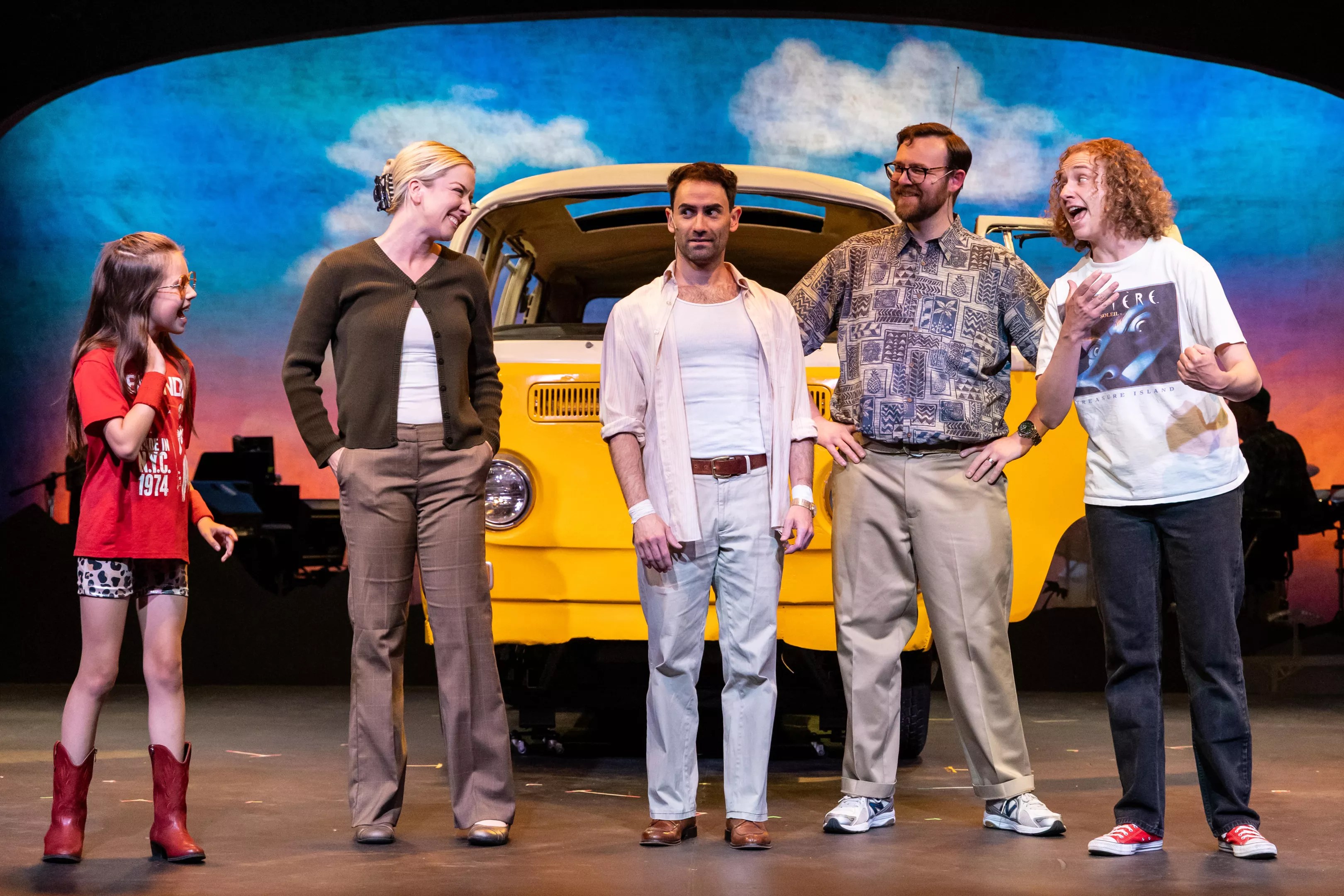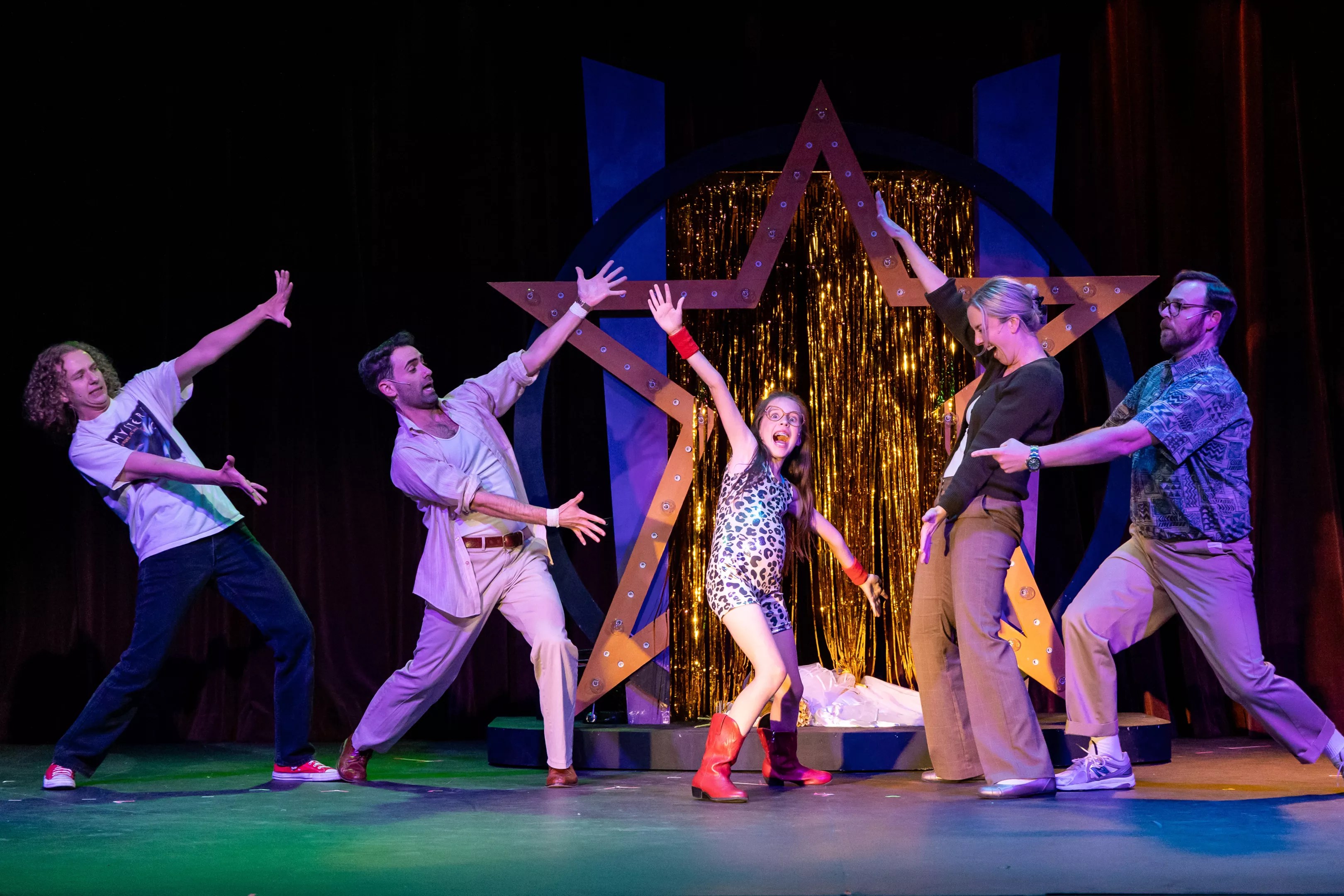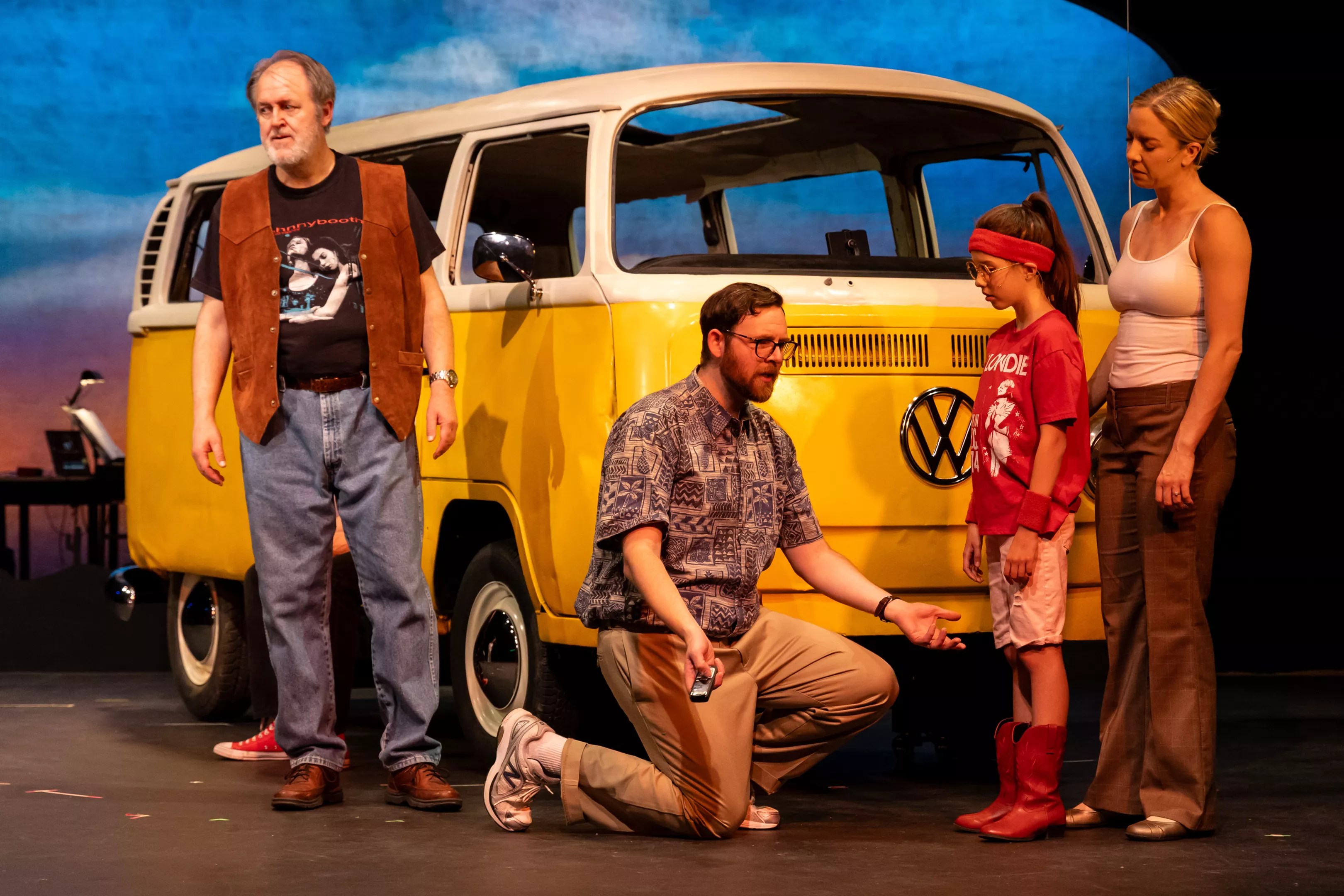
Courtesy of RDG Photography

Audio By Carbonatix
It’s fitting that Little Miss Sunshine centers on a sputtering yellow VW van, because this musical adaptation never really gets out of first gear.
Directed by Warren Sherrill and featuring a committed cast of local talent, this show boasts energy, polish and some strong performances, but the Aurora Fox Arts Center’s latest production can’t overcome the fundamental issue at its core: this story should never have been musicalized.
Based on the beloved 2006 Academy Award-winning film by Michael Arndt, the musical version, with a book by James Lapine and music and lyrics by William Finn, tells the familiar story of the dysfunctional Hoover family’s chaotic cross-country road trip from Albuquerque to California. Their goal? To get the spirited, bespectacled Olive (Madeleine O’Donnell) to a children’s beauty pageant.
Along for the ride are her self-help-obsessed dad, Richard (Matthew Murry), overburdened mom, Sheryl (Noelia Antweiler), brother Dwayne (Gabriel Hannah Smothers), who’s taken a vow of silence until he becomes a fighter pilot, suicidal gay uncle Frank (Gavin Juckette) and foul-mouthed, heroin-snorting Grandpa (Erik Sandvold).
But what was sharp, sincere and subversively funny on screen is flattened in this stage version into a clunky mess of unnecessary ballads, overwritten backstories and baffling tonal choices.
Let’s get nerdy for a second. To explain what constitutes a good musical number, musical theater educators often employ the term “bubble theory,” which describes how songs in musicals emerge when emotions become so intense that they cannot be expressed. The classic progression is speech, song and then dance.
However, the story in Little Miss Sunshine focuses on emotional repression, not expression. Most of the characters are bottled up by design. Forcing them to sing, especially in slow, introspective ballads, feels not only unnatural but deeply misaligned with the story’s DNA.
A few moments, like Grandpa’s “The Happiest Guy in the Van,” do work, thanks to Sandvold’s chaotic charm and the character’s raw honesty, but others fall painfully flat. Sheryl’s “Something Better Better Happen” and Richard’s “What You Left Behind” are emotionally limp, over-explaining what dialogue already makes clear.
Dwayne’s Act II number, after discovering he’s color-blind and can’t become a pilot, should be devastating. Instead, lyrics like “take me out on Friday with the trash” make it unintentionally juvenile (that line caused people around me to literally laugh out loud).

The Hoover family at the Little Miss Sunshine beauty pageant.
Courtesy of RDG Photography
Other choices veer from baffling to borderline creepy. In the original film, Olive’s final pageant performance, choreographed by Grandpa, is a tongue-in-cheek striptease set to “Super Freak,” mocking the sexualized nature of the pageant industry.
In the musical, the song becomes “Shake Your Badonkadonk,” complete with Olive wearing her mother’s wedding dress and crooning a weirdly sexualized tune seemingly written by Grandpa about a bride having sex when she gets married. What was once playful now feels uncomfortable.
The show also inexplicably centers Richard and Sheryl’s relationship rather than the overall family dynamic. We see a flashback to them in the back of the van when it is revealed Sheryl is pregnant with Dwayne, which adds nothing to the story and undermines the film’s strength: its emphasis on the present moment and the evolution of all the Hoovers.
Similarly, at the pageant, the central tension about Olive competing in the Little Miss Sunshine pageant prompts the parents to go backstage to check on her, but instead of a discussion about what is best for Olive, it becomes another didactic regurgitation of their marital drama. The result? The emotional stakes are muddled, and Olive is sidelined in her own story.
Frank, arguably the film’s most complex character, suffers the most in translation. A gay Proust scholar who’s survived a suicide attempt, Frank’s painful run-in with his ex and rival at a gas station is a masterclass in quiet devastation on screen. In the musical, it becomes a blunt-force patter song (“How Have I Been?”) that robs the moment of its nuance.
Even the show’s humor, which the original film balanced with pathos, is often grating here. One frustrating example is the transformation of Miss California (Jenna Moll Reyes) from an articulate, supportive pageant winner who advises Olive to a dumb stereotype who struggles to read.
Meanwhile, memorable set-ups from the film, like the iconic diner scene where the family rallies around Olive after Richard shames her for ordering ice cream, are stripped of their payoff. In this version, after she asks for ice cream and is told it will make her “fat,” no one stands up for her, and the callback when she asks Miss California if she eats ice cream at the pageant never arrives.
And then there are the logistical blunders in the script. In the film, it’s clear why the family must push the broken-down van and jump in once it reaches speed. Onstage, that setup is botched: we’re told that the clutch cable is broken, but there’s no clear explanation of what that means or why pushing the van is the solution. It is one of several instances in which the musical assumes familiarity with the film, taking unearned shortcuts that leave newcomers in the dust.
Unfortunately, those same muddled choices extend beyond the script and into the staging. While the production team admirably commits to capturing the visual essence of the film, their realism sometimes works against them, particularly in the show’s most dominant scenic element: the family’s yellow VW van.

The Hoover family in the Aurora Fox’s production of Little Miss Sunshine.
Courtesy of RDG Photography
Scenic designer Brandon Philip Case has recreated the vehicle in striking detail. The trouble is, it’s too faithful. Because the van is completely enclosed except for a sunroof, audiences, particularly those on the mezzanine, are frequently unable to see what is going on inside. Critical scenes, like Dwayne’s color-blindness revelation, are lost visually. It’s a case of form over function. A more abstract or open design could have allowed visibility without sacrificing the van’s symbolism.
When the van isn’t dominating the stage, other scenic elements are quickly wheeled on and off to make way for its return, making the world feel frustratingly limited in scope.
Still, some technical elements do shine: Brett Maughan’s lighting design and projections of a moving road on the back screen effectively evoke the illusion of travel, helping bring momentum to scenes that desperately need it. And Alec Steinhorn’s five-piece band delivers Finn’s orchestrations with polish, even if the songs themselves rarely land.
Sandvold steals the show as Grandpa, fully embracing the role’s “fuck it” energy. Rakeem Lawrence and Brian Watson both impress in multiple roles, navigating multiple character changes with ease. O’Donnell is a charming Olive, albeit limited by the material, and Smothers gives Dwayne a thoughtful presence despite being oddly sidelined in Act Two.
Antweiler and Murry bring grounded emotionality to Sheryl and Richard, especially in dialogue-driven scenes, but their musical moments feel forced and unearned. Juckette’s Frank never quite connects emotionally, which may be an attempt to reflect his character’s alienation, but the lack of visible change undermines his arc.
Ultimately, Little Miss Sunshine is a baffling case of adaptation gone wrong. The original film worked precisely because it was small, specific and unsentimental. This musical wants to inflate it into a heartfelt, crowd-pleasing spectacle but ends up reducing its characters into caricatures and its themes into platitudes.
The Aurora Fox production is polished and well-acted, but no amount of craft can save a road trip that should have never left the garage.
Little Miss Sunshine runs through Sunday, June 29, at the Aurora Fox Arts Center, 9900 East Colfax Avenue. Tickets are $17 to $42; learn more at aurorafoxartscenter.org.